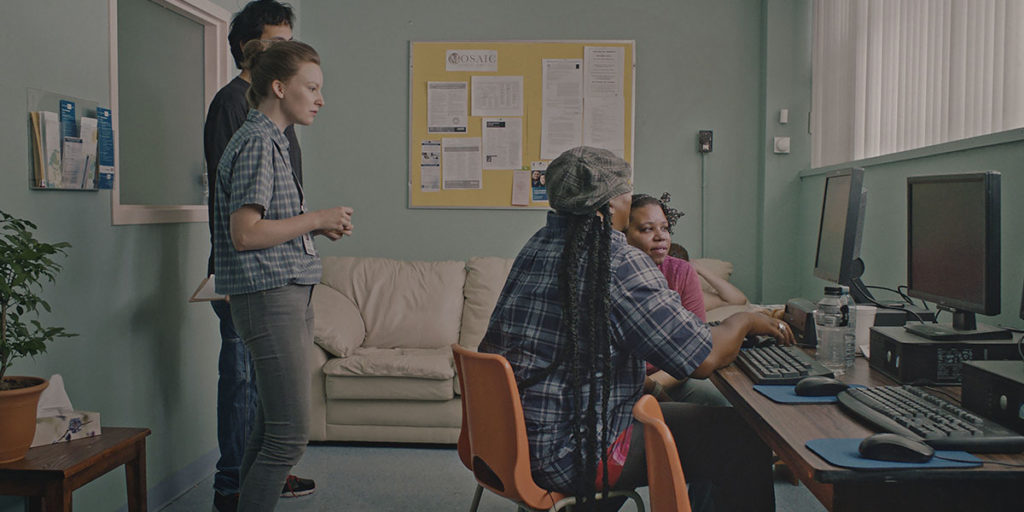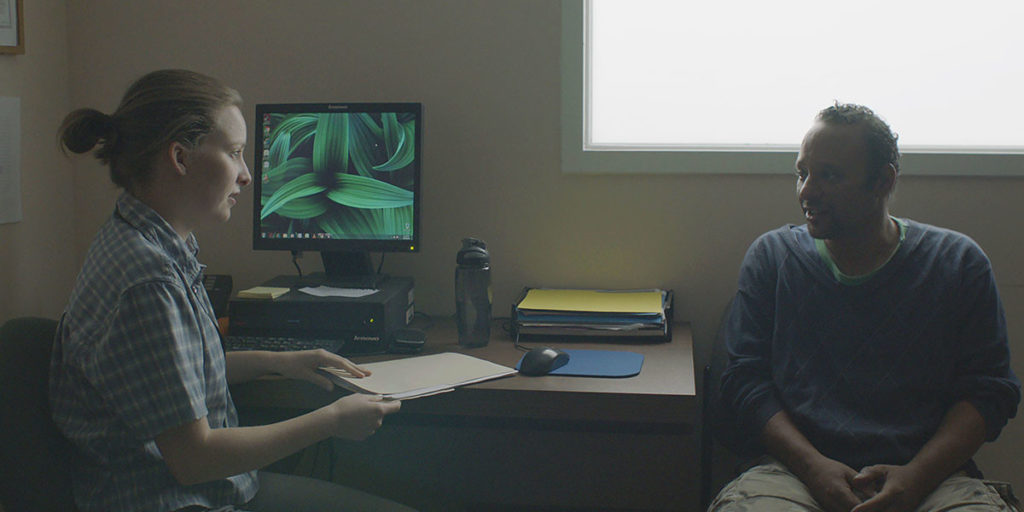Reviews include The Fall Guy, The Idea of You, and Jeanne du Barry.
An Interview With: Antoine Bourges
June 7, 2018
A chamber drama that’s equally attentive to the social graces of its characters and the homely office chairs they sit on.

It’s not often that a film depicts a copy room with the delicacy and warmth of Antoine Bourges’s Fail to Appear, a minimalist first feature that traces the tentative interactions between Isolde (Deragh Campbell), a wet-behind-the-ears Toronto caseworker who wants to do well by her clients, and Eric (Nathan Roder), her most recent charge, a thirtysomething man with mental health issues arrested for petty theft in an electronics store. For all its modesty as a narrative, Isolde’s efforts to keep Eric on a safe track in the brief time they have together makes for some absorbing and moving humanist drama, thanks to Bourges’ keen observational eye, austere but never dispassionate framing, and good ear for what people doing their best sound like, whether they’re working within flawed institutions or they’re subject to them.
Angelo Muredda spoke to Bourges by phone ahead of Fail To Appear’s screening as part of TIFF’s and Cinema Scope’s MDFF Selects program, and subsequent weeklong run at the TIFF Bell Lightbox. They talked about the politics of observational cinema, the strange aesthetic potential of office decor, and the peculiar energy non-professional actors bring to fictional films.
TFCA: It strikes me that this is a political film, despite the absence of any obvious political grandstanding or speechifying on your part or your characters’ part. Was it a conscious decision on your part to stand back and observe the way these people’s lives intersect with these institutions they’re stuck with?
Bourges: When I start a film I don’t really think about in terms of making a political point. I think about it more in terms of building characters. I spend a lot of time observing actual people who go through the experiences I want to show in the film. A lot of it has been about observing and writing and representing or re-enacting what I’ve seen.
In terms of the way these characters are represented, I think what interested me about these systems is that a lot of them come from a good place. I like the complexity of that situation — that these case management agencies are there to help people. Even the court system we observe in this film is a mental health court, which is meant to allow people with mental health problems who have committed very petty crimes to not stay in jail for too long. These are programs that come from good intentions, and what interested me — and what is maybe near to or almost political, to go back to your earlier question — is that the thing that might be lacking here is something more human. No system can be really adequate to deal with people, and that human lack is very complex and hard to fix.
One of the things I love about this film, following from that human x-factor, is the way it unfolds largely through vulnerable conversations between two people who represent different sides of the legal system. These scenes are often awkward, halting, and sweet, in contrast to the incredibly formalized, almost stagey language of the courtroom. How do you approach the vulnerability of these scenes, as opposed to the more formulaic nature of the courtroom?
I think, like you said, those conversations are very intimate, and in them people have to reveal things that are very personal about themselves. I think that’s what interested me at least with Isolde. Part of her job is to create a connection, and to instil a sense of trust in order to get people to talk about these things. These clients are not more comfortable than you and I are to talk about their financial situations or their mental health situations. It can be hard for these workers to instil that sense of trust, so I felt like that would be interesting to show. Sometimes it happens in these moments of missed communication, which can feel at times like they might not be going somewhere — either because the person doesn’t speak your language or because something is just not coming across.
When it comes to the court, that came from something a bit different. Observing these hearings, I found often that I related more to the people sitting in the box than with the people involved in staging this theatrical performance or hitting their marks — it felt like watching a play. That’s echoed in the film a little bit with the documentary fiction element — you’d see someone who feels like he’s alive and real and someone in another part of the room who seems like they’re on a stage.
Talking of stagecraft, you spend a lot of time in this film giving us a sense of the space where social workers like Isolde work — the copier, her work desk with some sad-looking tangerines on it, the meeting table you have to set up. Why do you think it’s important to orient us to these spaces?
Part of it is just a weird aesthetic fetish. People often say it’s bleak, and I let them say that because it’s in the eye of the beholder [laughs]. But I actually find these places quite pretty — even that photocopy room. I think what’s interesting is the combination of the staged and not staged in these places. They’re places that are purely functional, obviously — you see that even in the ways the chairs are set up for people to sit and talk. They’re made for a single function, but at the same time, the people who inhabit these places, the kinds of conversations that happen in these places, the kinds of faxes that are received in this copy room, have the most intense human content that you can imagine. These are the types of images I find motivating when I start writing a movie.
I wonder if you could talk about Deragh Campbell’s character. She’s a literature student trying to figure out how to apply those skills in this new, real world. She’s in a kind of transitional state, much like Eric. Is there something dramatically compelling about her being early in her career?
I think it’s important. On the most basic level I like to get an introduction to a place from someone who is not as familiar with that place, just as a narrative conceit. I also liked that this character had a relationship with reality that was complex and not completely resolved. Like you said, she comes from a literature background, she has this empathy for characters, and then she makes this decision to go into the real world and apply this theoretical empathy there. I think that is echoed in Eric. Her relationship to reality makes her very fragile because she’s in doubt — this operation that she’s created seems to not be completely successful, at least not for now. I think his relationship to reality is complex because he struggles with his mental health issues and the reality of the world, feeling marginalized. When I was thinking about her and her character, I kept thinking back to him as well. I was thinking about the different forms of fragility they faced in the presence of one another.

There’s something beautiful about watching them interacting because of or in spite of their vulnerabilities.
It felt like because they had these similar but very different forms of fragility, they couldn’t stay together for very long. It sort of dictated how the film was structured. They were meant to repel each other, like magnets pushing each other in opposite directions.
There are a lot of fantastic performances here, including from non-professional actors like our mutual friend [and TFCA critic] Adam Nayman, who plays Eric’s duty counsel. It’s a fictional film, and it feels scripted and textually rich, but there’s a lot of reality and spontaneity in it. How much does that come from having a non-professional cast?
I built the film as a fictional film, though it does get programmed in doc festivals and is seen as a near-doc film at times. I think there’s a way you observe people who are non-actors that is different from how you observe actors, and it has something to do with observing them being as opposed to conveying information for the next scene.
This is a very Toronto-centric movie, but not in a cliched way, as if you’re ticking off recognizable Toronto locales. Yet it’s unmistakably shot here, from the TTC train Isolde and Eric ride on to a particular strip of Bloor Street they walk after his hearing. How do you approach shooting in a semi-recognizable Toronto?
Someone told me that some of the characters, especially Eric, feel like the utmost Canadian characters who couldn’t exist outside of here, especially outside of Ontario. I’m not sure, because I’m not from here. In terms of the city, I really thought about it in terms of trying to find a homogeneous aesthetic for the film — not trying to check off boxes but at the same time being specific to the stories that I used to write this story, adding specificity for the sake of the film having a more genuine pull. Tangentially, it happened to feel like a very Toronto film, I think.
Fail to Appear screens Thursday at 9 p.m. at TIFF Bell Lightbox until June 14th.



